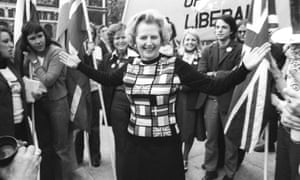
Andy Beckett
Friday 1 July 2016 16.31 BST

‘Over the four decades since the 1975 referendum, Tory Europhilia – as epitomised by Margaret Thatcher, above – has turned so thoroughly into its opposite it seems unimaginable.’ Photograph: PA
Like a familiar blanket grabbed on a stormy night, since the referendum last week a conventional wisdom has quickly formed on the left that the result was largely a protest against the polarisation of Britain begun by Margaret Thatcher. It’s an appealing argument: as if the “left behind” Brexit voters in northern Britain were descendants of the mutinous Liverpool dole claimants in Alan Bleasdale’s 1982 drama Boys from the Blackstuff.
But like all conventional wisdoms, this one is worth questioning. First, because the Brexit vote in northern Britain was actually quite patchy. In Liverpool – the city for which Thatcher’s deceptively mild-mannered chancellor Geoffrey Howe proposed “managed decline” in 1981 – the remain vote was 58%. In Scotland, the guinea pig for Thatcher’s poll tax, remain got 62%.
Second, British deindustrialisation and the dominance of southern England did not start simply with Thatcher’s election in 1979. Global changes in trade and manufacturing that continue to this day – the export supremacy of Germany, the outsourcing of factory work to Asia – had been hollowing out northern Britain for years beforehand. Tom McNally, a key adviser to Thatcher’s Labour predecessor as prime minister, Jim Callaghan, told me in 2006: “Throughout the 1970s, the mills in my constituency in Stockport were just melting away.” Much of Boys from the Blackstuff, it is rarely noticed, was written under Callaghan.
These economic and social trends began generating political discontent well before the Thatcher government coldly accelerated them. In 1975, in the United Kingdom’s previous referendum on Europe, 47.5% of Labour supporters voted to leave the EEC – at least a third more than last week – according to an analysis by the Economist approvingly cited by David Butler and Uwe Kitzinger in their definitive book The 1975 Referendum.
And, just like last week, the Leave vote was particularly strong in south Yorkshire and the north-east. In its underlying political instincts, England often changes less fast than commentators hungry for historic turning points like to think.
Third, if a contest as fickle and hard to read as a referendum can be said to have swing voters, last week’s were probably not the “left behind” – however vivid a story they make for visiting London journalists – but another, larger, more prosperous, more politically powerful group, which has been growing for so long that it is taken for granted.
In the 1975 referendum, 85% of Conservative supporters voted to stay in the EEC. The whole rightwing press except the Spectator advocated continued EEC membership. The UK’s EEC entry had been negotiated by a Tory premier, Edward Heath, only two years earlier. Throughout the 70s, membership was supported by almost every leading Conservative, Thatcher included.
Over the four decades since, that pervasive Tory Europhilia has turned so thoroughly into its opposite that it now seems unimaginable. The cooperative, compromising, bureaucratic EEC – a classic product of centrist postwar Europe – has been one of many victims of the Tories’ long shift rightwards.
One of the originators of this shift was the free-market thinktank the Centre for Policy Studies (CPS), founded the year before the 1975 referendum by Margaret Thatcher and two of her fiercest early allies, Alfred Sherman and Keith Joseph. As an organising base and a source of ideas, the CPS played a vital behind-the-scenes role in her capture of the Conservative leadership, election as prime minister, and transformation of Britain into the profoundly unequal country we inhabit today.
At 4.59am last Friday, within minutes of the BBC declaring victory for Brexit, a gleeful email from the CPS appeared in my inbox. “The weakness of the Labour party and the resolution of the EU question have created a unique political opportunity to drive through a wide-ranging … revolution on a scale similar to that of the 1980s,” it began. “This must include removing unnecessary regulatory burdens on businesses, such as those related to climate directives and investment fund[s].”
In the post-EU Britain that now lies hazily before us, the removal of such checks on the free market – however limited they have become, as the EEC has itself moved rightwards in recent decades – is unlikely to be pleasant for many Britons. But the “left behind” look most vulnerable, given their lack of secure employment and economic power, compounded by austerity, recession and the southern bias of the current Conservative government, which has reversed the modest northern achievements of Tony Blair and Gordon Brown.
Three years ago Michael Gove, MP for the comfortable Home Counties seat of Surrey Heath, and soon possibly our first Brexiteer prime minister, was invited by the CPS to give a lecture. The occasion, Gove began, “gives me a chance to affirm my admiration for the principles of the CPS ... I look forward to the CPS playing an even bigger role in the nation’s political life in the decades to come.”
Far from giving two fingers to Thatcher’s vision of Britain, the vote for Brexit may finish her work.
• Andy Beckett’s Promised You a Miracle: UK80-82 is published by Allen Lanec
https://www.theguardian.com/commentisfree/2016/jul/01/margaret-thatcher-brexit-thatcherism-leave-1980s